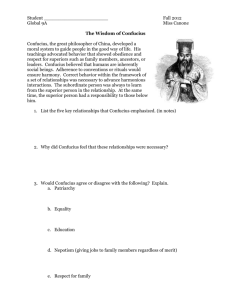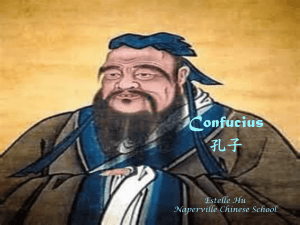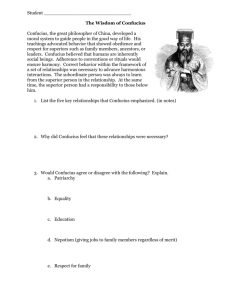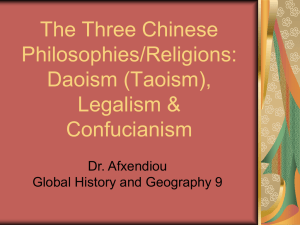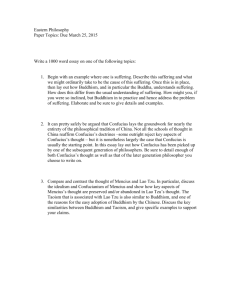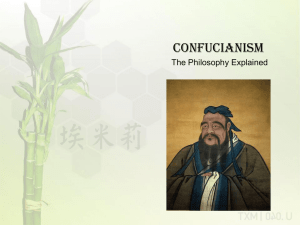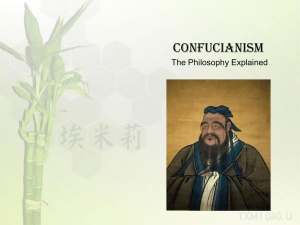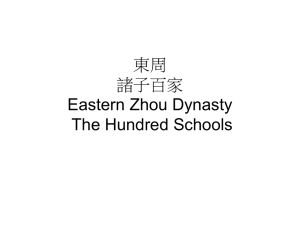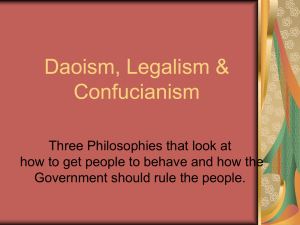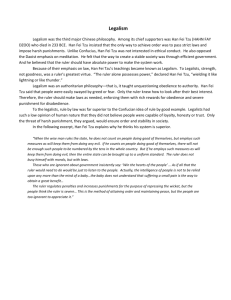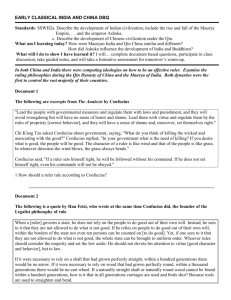Schools of Thought Documents
advertisement
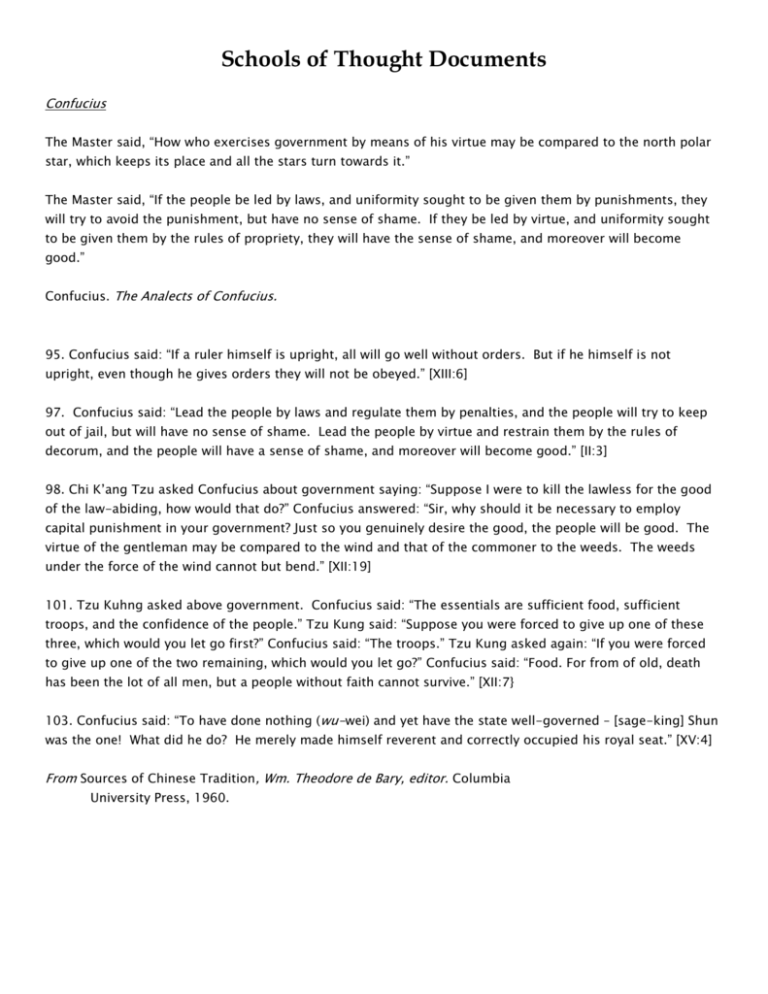
Schools of Thought Documents Confucius The Master said, “How who exercises government by means of his virtue may be compared to the north polar star, which keeps its place and all the stars turn towards it.” The Master said, “If the people be led by laws, and uniformity sought to be given them by punishments, they will try to avoid the punishment, but have no sense of shame. If they be led by virtue, and uniformity sought to be given them by the rules of propriety, they will have the sense of shame, and moreover will become good.” Confucius. The Analects of Confucius. 95. Confucius said: “If a ruler himself is upright, all will go well without orders. But if he himself is not upright, even though he gives orders they will not be obeyed.” [XIII:6] 97. Confucius said: “Lead the people by laws and regulate them by penalties, and the people will try to keep out of jail, but will have no sense of shame. Lead the people by virtue and restrain them by the rules of decorum, and the people will have a sense of shame, and moreover will become good.” [II:3] 98. Chi K’ang Tzu asked Confucius about government saying: “Suppose I were to kill the lawless for the good of the law-abiding, how would that do?” Confucius answered: “Sir, why should it be necessary to employ capital punishment in your government? Just so you genuinely desire the good, the people will be good. The virtue of the gentleman may be compared to the wind and that of the commoner to the weeds. The weeds under the force of the wind cannot but bend.” [XII:19] 101. Tzu Kuhng asked above government. Confucius said: “The essentials are sufficient food, sufficient troops, and the confidence of the people.” Tzu Kung said: “Suppose you were forced to give up one of these three, which would you let go first?” Confucius said: “The troops.” Tzu Kung asked again: “If you were forced to give up one of the two remaining, which would you let go?” Confucius said: “Food. For from of old, death has been the lot of all men, but a people without faith cannot survive.” [XII:7} 103. Confucius said: “To have done nothing (wu-wei) and yet have the state well-governed – [sage-king] Shun was the one! What did he do? He merely made himself reverent and correctly occupied his royal seat.” [XV:4] From Sources of Chinese Tradition, Wm. Theodore de Bary, editor. Columbia University Press, 1960. Legalism Han Feizi: “When the sage rules the state, he does not count on people doing good of themselves, but employs such measures as will keep them from doing any evil. If he counts on people doing good of themselves, there will not be enough such people to be numbered by the tens in the whole country. But if he employs such measures as will keep them from doing evil, then the entire state can be brought up to a uniform standard. Inasmuch as the administrator has to consider the many by disregard the few, he does not busy himself with morals but with laws.” P. 141 “Similarly, though without the use of rewards and punishments there might happen to be an individual good of himself, the intelligent ruler will not prize him. The reason is that the law of the state must not be sidetracked and government is not for one man. Therefore, the capable prince will not be swayed by occasional virtue, but will pursue a course that will assure certainty.” P. 142 Sugar-coating their speech, the Confucianists say: ‘If you listen to our words, you will be able to become the leader of all feudal lords.’ Such people are but witches and priests among the itinerant counselors, and are not to be accepted by rulers with principles. Therefore, the intelligent ruler upholds solid facts and discards useless frills. He does not speak about deeds of humanity and righteousness, and he does not listen to the words of the learned man. P. 142 Those who are ignorant about government insistently say: ‘Win the hearts of the people.’ If order could be procured by winning the hearts of the people, then even the wise ministers Yi Yin and Kuan Chung would be of no use. For all that the ruler would need to do would be just to listen to the people. Actually, the intelligence of the people is not to be relied upon any more than the mind of a baby. P. 142-143 The reason for the ruler to look for wise and well-informed men is that the intelligence of the people is not such as to be respected or relied upon. P. 143 From Sources of Chinese Tradition, Wm. Theodore de Bary, editor. Columbia University Press, 1960. Li Si: The fact that intelligent rulers were able for a long time to hold high position and great power is due only to their ability always to apply severe punishments. It was for this reason that none in the empire dared to be rebellious. If a ruler does not take care to prevent rebellion, but instead acts like the loving mother who spoils her children, indeed he has not understood the principles of the wise men who came before him. When a ruler fails to practice the advice for governing the state left by the sages, what else does he do except make himself the slave of the empire? Is this not a pity? From Sources of Chinese Tradition, Wm. Theodore de Bary, editor. Columbia University Press, 1960.

